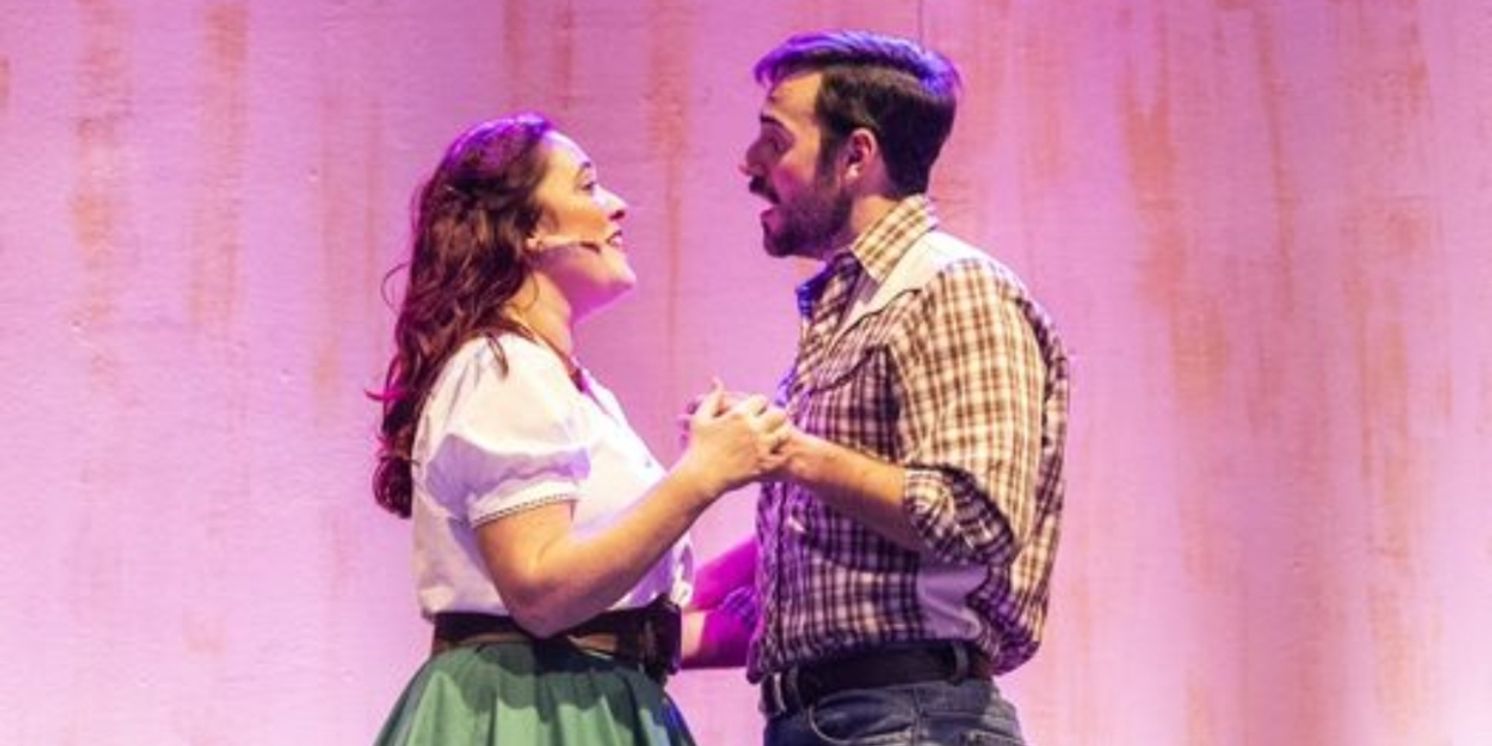
Reviewed by Ewart Shaw, Thursday 23rd May 2024.
The Gilbert and Sullivan Society presents Oklahoma, a show so full of memorable tunes you have to stop yourself from singing along. Musically, it’s easily up to the excellent standard we expect from the company. This production, directed by Richard Trevaskis, is not quite what you might expect. Many of the audience on the opening night were confused by what they didn’t see. There is no farmyard, no field of waving wheat. There's no hawk tracing lazy circles in the sky. The action takes place in a large room with plain wooden walls lit by three elaborate chandeliers. There are tables and chairs for the cast to sit at, clamber over, and dance on.
There's no orchestra in the pit. There are two keyboard players on stage throughout, Musical Director, Daniel Brunner, and Martin Cheney. They even take on small, named roles. There's been a tendency over the last few years to take on traditional well-loved musicals and strip them of their sentimental hangings and trappings. Fortunately, having chosen to take this approach, Trevaskis knows how to get the best out of his small cast. Oh yes, it's a small cast. There are 14 singers on stage. One thing that works really well is the choreography by Vanessa Redmond. There are, as I expected, references to the Beyonce This Ain't Texas video clip that has given people a taste of boot-scooting, but the fine dancing from everyone is a joy to experience.
I have to say I've had a weakness for cowboys since that rodeo rider sold me the shirt off his back, in a bar, for beer money. It was a nice shirt, a genuine American Brooks and Dunn rodeo rider’s shirt in black and red. I wish I still had it. Daniel Hamilton, as Curly, is not your big broad-shouldered, rough-riding cowboy. He's cute, with an endearing smile, and he knows how to put a song across. He’s hardly recognizable from the macho Fred/Petruchio from last year’s Kiss Me Kate in the Hills Musical Society production. Jason Benson, as Will Parker, his best mate, is equally engaging as a cowboy in love.
The villain of the piece is the misunderstood Jud Fry. Misunderstood and misidentified, there is enough evidence to suggest that he's a psychopath of a particularly nasty kind revelling in the burning down of farmhouse and the killing of its residents. Oh, he's only been passing on a story he heard. You just get the impression he is the guy who lit the match. Fahad Farooque has been working so hard in non-professional musical theatre here in SA and, as Jud Fry, he really has hit his straps. In so much of the first act, he moves quietly through the happy throng, an observant non-participant. It's a remarkable piece of work.
Sophie Stokes as Laurey Williams is a strong presence. There is nothing of the frail young woman about her. Her Laurey is someone who can who can certainly run a farm out there on the borderlands. Carolyn Ferrie’s Aunt Eller is no old-age pensioner churning butter on the veranda. She’s certainly in charge. Cassidy Gaiter is delightful as Ado Annie and, in fact, her big number really ignites the first act. Bethany Eloise, as Gertie Cummings, has the sort of screaming laughter that would frighten wild animals. She is really so annoying, so perfectly annoying in the part. Robin Schmelzkopf is the Persian traveller, Ali Hakim, but in costume and makeup, the orientalism is downplayed. James McCluskey-Garcia does a great job representing the farmers.
”Everything is up to date in Kansas City.” goes the song, “They’ve gone about as far as they can go”. I mentioned the new tendency to reassess old favourites with the cold eye of a modern sensibility. In his director’s note, Trevaskis makes it clear about the role of patriarchy and colonialism in the story behind the script. “There are issues of violence, particularly towards women, and sexual predation. There is bullying, the proliferation of guns, and even corruption in the legal system. It’s all in the original script if we wish to see it.”
It is all there, and the establishment of that state in 1906 rode roughshod over the tribal lands and the people who had lived there for centuries. That industrialized push from the East Coast to the West Coast was inevitably destructive, but for a few hours in the theatre there’s a celebration of heroism, love, and community, with lots of bloody good songs. If you find the vision a little confusing, just close your eyes and enjoy the show.
If you look at the cast notes in the program, you’ll see just how much experience, here, interstate, and overseas, the cast brings to the stage. You’ll also get their preferred pronouns.
Reader Reviews

Videos

